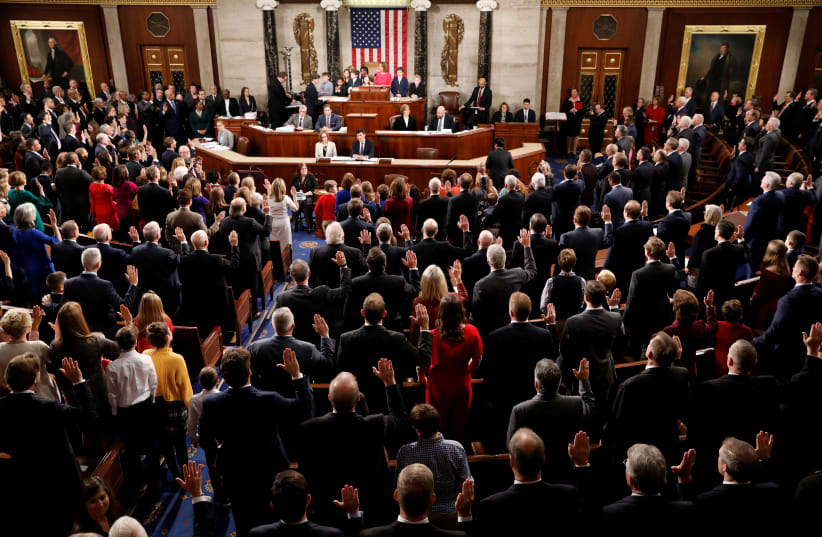WASHINGTON – A group of 119 Republican members of the House of Representatives sent a letter to President Joe Biden on Monday, urging him not to reenter the 2015 nuclear agreement with Iran “as is,” without addressing some of the original deal’s weaknesses.
“As is, this deal is not a pathway to prevent Iran from acquiring a nuclear weapon,” the letter reads. “It is a blueprint for exactly how Iran can secure massive sums of money and obtain a nuclear weapon in short order.”
They went on to say that “compounding the threat, this approach turns a blind eye to Iran’s non-nuclear destabilizing activities throughout the world, such as its support for international terrorism and continued development of its ballistic missile arsenal.”
Biden said on Sunday that the US would not lift sanctions on Iran to get the Islamic Republic back to the negotiations table. During an interview with CBS’s Face the Nation ahead of Super Bowl LV, he was also asked if Iran must stop enriching uranium first, and nodded his head in affirmation.
In their letter, the Republican members argued that the decision to withdraw from the JCPOA was in America’s best interests. “Even if the United States never withdrew from the deal, poorly construed sunset provisions baked into the deal would now be upon us, meaning Iran would be well on its way to obtaining a nuclear weapon while having violated not only the spirit but the letter of the deal,” they wrote.
US Secretary of State, Antony Blinken, warned last week that Iran is only months away from being able to produce enough fissile material for a nuclear weapon. In his first interview since taking office last week, Blinken told NBC News that if the Islamic Republic were to keep backing away from its commitments under the 2015 nuclear agreement, it could be “a matter of weeks.”
He reiterated that the US would return to compliance with the JCPOA once Iran does the same and called again for a “longer and stronger” agreement.
The Republican members of congress addressed the Iranian nuclear capabilities, writing: “With one directive from the Ayatollah, Iran was able to ramp up its nuclear program to pre-deal levels within days, demonstrating the weakness of the agreement. Neither our European partners nor any international body was able to prevent Iran from taking such steps, despite still being technically bound to the agreement.”
“The United States must heed key lessons learned from the 2015 negotiations with Iran,” they continued. “Then, like now, Iran wants the US to come to the negotiating table due to the biting pain of our maximum pressure sanctions regime.”
They went on to say that the United States “must not once again abandon the leverage that is bringing Iran back to the negotiating table without confronting both Iran’s nuclear and non-nuclear activities that need to be stopped.”
The members of Congress also called on Biden to make sure that any future agreement receives bipartisan support, “and be submitted to the United States Senate to be ratified as a treaty.”
“We must all learn from the lessons of the past and ensure that any future nuclear agreement signed between the US and Iran is binding, sustainable, verifiable, and supported by our regional allies,” they added. “We must not be naive, desperate or weak in how we move forward.”
Ned Price, the State Department spokesman, said last week that the administration would consult with America’s allies and Congress before it engages directly with the Iranians.
“For reasons that include expiring sunset clauses, flaws with the verification arrangement, and many other dynamics, attempting to reenter the Iran Nuclear Deal as is would be a strategic US foreign policy blunder,” said Rep. Lee Zeldin (R-NY), who spearheaded the letter.
In December, following Biden’s victory in the presidential election, a group of 150 House Democrats encouraged him to rejoin the deal. “We strongly endorse your call for Iran to return to strict compliance with the nuclear deal, the United States to rejoin the agreement, and subsequent follow-on negotiations,” the House Democrats wrote. “We understand that returning to the agreement will require the selective lifting of some sanctions and rigorous implementation to verifiably ensure Iranian compliance.”
